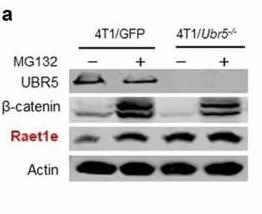Cat. #151540
Anti-RAET1E [RAET1E 79/6]
Cat. #: 151540
Sub-type: Primary antibody
Unit size: 100 ug
Availability: 3-4 weeks
Target: RAET1E
Class: Monoclonal
Application: ELISA ; FACS ; IF ; IP ; Fn ; WB
Reactivity: Human
Host: Mouse
£300.00
This fee is applicable only for non-profit organisations. If you are a for-profit organisation or a researcher working on commercially-sponsored academic research, you will need to contact our licensing team for a commercial use license.
Contributor
Institute: University of Cambridge
Tool Details
*FOR RESEARCH USE ONLY (for other uses, please contact the licensing team)
- Name: Anti-RAET1E [RAET1E 79/6]
- Alternate name: UL16 binding protein 4; NKG2D Ligand 4; Latel
- Research fields: Immunology
- Clone: RAET1E 79/6
- Tool sub type: Primary antibody
- Class: Monoclonal
- Conjugation: Unconjugated
- Reactivity: Human
- Host: Mouse
- Application: ELISA ; FACS ; IF ; IP ; Fn ; WB
- Description: RAET1E (Retinoic Acid Early Transcript 1E), or ULBP4, is a member of the RAET1 family of major histocompatibility complex (MHC) class I-related genes. RAET1E and RAET1G differ from the other RAET1 proteins by having a type I membrane-spanning sequence at their C termini rather than glycosylphosphatidylinositol anchor sequences. RAET1E is a functional ligand for NKG2D, which causes lymphocyte activation resulting in the secretion of cytokines.
- Immunogen: Recombinant protein of human RAET1E protein produced in E.coli with a N terminal 6x His tag
- Isotype: IgG1 kappa
- Recommended controls: Stable RAET1E cell line
Target Details
- Target: RAET1E
- Tissue cell line specificity: Stable RAET1E cell line
- Target background: RAET1E (Retinoic Acid Early Transcript 1E), or ULBP4, is a member of the RAET1 family of major histocompatibility complex (MHC) class I-related genes. RAET1E and RAET1G differ from the other RAET1 proteins by having a type I membrane-spanning sequence at their C termini rather than glycosylphosphatidylinositol anchor sequences. RAET1E is a Fn ligand for NKG2D, which causes lymphocyte activation resulting in the secretion of cytokines.
Applications
- Application: ELISA ; FACS ; IF ; IP ; Fn ; WB
Handling
- Format: Liquid
- Concentration: 1 mg/ml
- Unit size: 100 ug
- Storage buffer: PBS with 0.02% azide
- Storage conditions: -15° C to -25° C
- Shipping conditions: Dry ice
References
- McGilvray et al. 2010. Int J Cancer. 127(6):1412-20. PMID: 20054857.
- ULBP2 and RAET1E NKG2D ligands are independent predictors of poor prognosis in ovarian cancer patients.
- Ohashi et al. 2010. J Biol Chem. 285(22):16408-15. PMID: 20304922.
- Post-translational modification of the NKG2D ligand RAET1G leads to cell surface expression of a glycosylphosphatidylinositol-linked isoform.
- Cao et al. 2007. J Biol Chem. 282(26):18922-8. PMID: 17470428.
- RAET1E2, a soluble isoform of the UL16-binding protein RAET1E produced by tumor cells, inhibits NKG2D-mediated NK cytotoxicity.
- Eagle et al. 2006. Hum Immunol. 67(3):159-69. PMID: 16698438.
- Regulation of NKG2D ligand gene expression.
- Bacon et al. 2004. J Immunol. 173(2):1078-84. PMID: 15240696.
- Two human ULBP/RAET1 molecules with transmembrane regions are ligands for NKG2D.
- Chalupny et al. 2003. Biochem Biophys Res Commun. 305(1):129-35. PMID: 12732206.
- ULBP4 is a novel ligand for human NKG2D.
- Radosavljevic et al. 2002. Genomics. 79(1):114-23. PMID: 11827464.
- A cluster of ten novel MHC class I related genes on human chromosome 6q24.2-q25.3.





